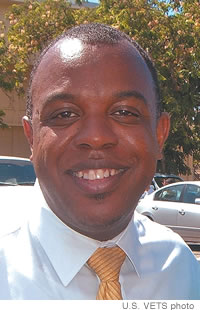Darryl Vincent

By .(JavaScript must be enabled to view this email address) | Share
 Del.icio.us
Del.icio.us
The issue of veteran homelessness has been festering for decades, and has driven U.S. VETS vice president of programs Darryl Vincent to help alleviate this problem.
For Vincent, homelessness comes down to one main element.
“The No. 1 reason people are homeless is poverty. Substance abuse and mental health are contributors that exacerbate the situation,” he says. “The reality is poverty and hopelessness keep people in that cycle of thinking that there is no way out.”
The answer to the homeless question for veterans and civilians alike is pretty clear to Vincent. “We need more affordable housing dedicated to low-income populations, but it is imperative that these neighborhoods are not segregated,” he says. “It is suppose to be a mixture. These people and families need to be integrated into the community, not isolated, and supportive services can help transition them from there.”
Vincent, who was featured on MidWeek‘s cover in July 2006, has been involved in many program advancements over the past four years. In 2007, U.S. VETS was selected to run Waianae Civic Center, getting homeless families off the beaches and into emergency housing. It has set up the Hoptel project (hospital/ hotel) for veterans who need help transitioning from hospitals, and re-integrating them into society. Most recently, U.S. VETS has released a video documentary, Oahu Facilities for the Homeless, aiming to educate agency staff, clients, students, advocates, legislators and the public about homeless services that are available throughout Oahu. The video will be available at local libraries and upon request to nonprofit human-service agencies, educational institutes, policy makers and the public. For video information, call U.S. VETS at 682-9000.
Vincent embraces the idea that in the next five years the words “homelessness” and “veterans” will no longer be used in the same sentence. “We don’t have the same issues we did with Vietnam War veterans, because we are catching them at earlier stages. With newer veterans, we are working with them immediately, which is a big advantage,” he says. “I get to work with so many intelligent people, from doctors to social workers, and we get to collaborate and take those ideas and implement them locally and nationally.”
E-mail this story | Print this page | Comments (0) | Archive | RSS Comments (0) |
Most Recent Comment(s):













